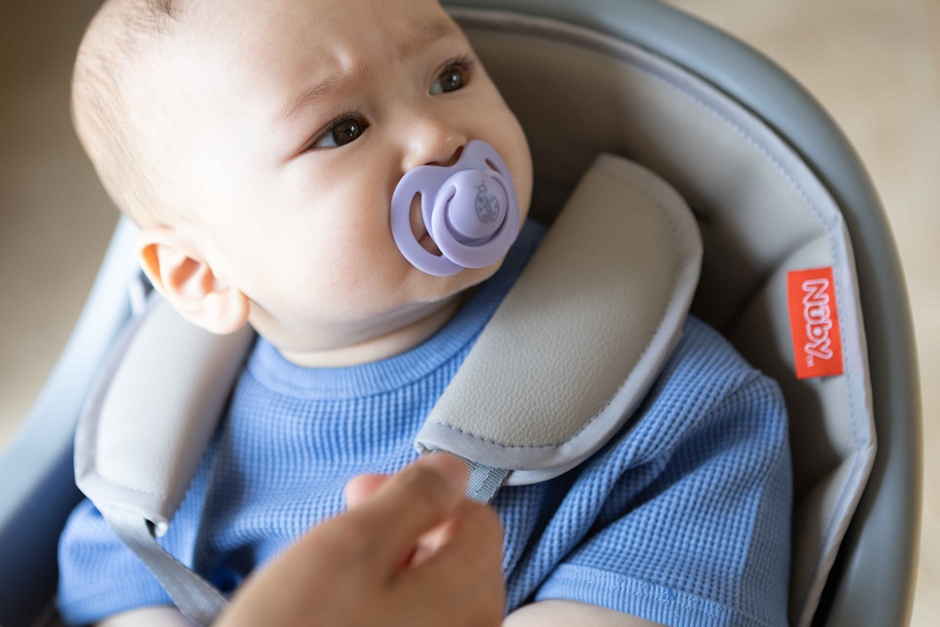Dummies, or soothers, are an essential item for many parents but with so much information out there, it's easy to feel overwhelmed when it comes to choosing, using and caring for them.
We’ve gathered some of the most Googled questions in the UK about dummies to help you navigate the world of dummies with confidence. From sterilisation methods to safety tips and advice on how dummies impact breastfeeding, we’ll cover everything you need to know based on a selection of the most searched-for queries.

- How to sterilise dummies?
Below we’ve shared how to sterilise dummies using some of the most common methods. Before starting, refer to the specific sterilisation instructions provided with your dummy. For example, Nuby dummies are suitable for all types of sterilisation methods.
Sterilising by boiling:
To sterilise a dummy using boiling water, begin by filling a saucepan with water. Ensure the dummy is fully submerged in the water and remember to press out any air from the teat before placing it in the pot. Allow the dummy to boil for about five to ten minutes.
Sterilising in the microwave:
For microwave sterilisation, you’ll need a microwave steriliser bag, available at retailers such as Boots or use a dummy case designed for the microwave. Place the dummy into the steriliser bag or case, add water as directed on the packaging and microwave for the recommended time stated in the instructions.
UV sterilisation:
UV sterilisation is a convenient, water-free method. Simply place the dummy inside a UV steriliser, like the Nuby UV Dummy Steriliser. This method is quick, taking just one minute and it is especially useful for sterilising dummies while out and about.
- Why do babies like dummies?
While giving a baby a dummy is a personal choice, it can be a helpful tool for some families to support their baby’s natural soothing instinct. There’s no right or wrong answer and it often depends on what works best for you and your baby. Babies could be drawn to dummies because they have an instinctive need to suck, even when they’re not feeding. This sucking reflex can help soothe and comfort them. Many parents find that dummies help calm their babies when they are unsettled or restless.
- How long do dummies stay sterile?
It’s important to clean a dummy before each use and after every subsequent use. Having multiple dummies can be helpful so there’s always a clean one available. According to the National Childbirth Trust, most manufacturers recommend re-sterilising a dummy after 24 hours but always refer to the specific instructions provided with your dummy to ensure proper care.
- How many dummies does a newborn need?
It’s ideal to have two dummies so they can be used in rotation. This ensures that you always have one sterilised and clean, ready to go, especially when you’re out and don’t have access to cleaning or sterilising facilities. Our Nuby dummies come in convenient packs of two, making it easier to always have a clean dummy on hand for your baby.
- Can dummies affect breastfeeding?
The NHS recommends delaying the use of a dummy if you’re breastfeeding until both you and your baby are comfortable with the feeding routine, typically around one month old. This is because using a dummy too early may interfere with your baby’s ability to latch properly, as the technique for a dummy is different from breastfeeding.
- How often should you replace dummies?
For safety and hygiene reasons, it’s recommended to replace your baby’s dummy after one to two months of use. However, if you notice any signs of damage or weakness, you should replace it immediately.
- Are dummies safe?
Dummies are safe when used correctly this includes regular cleaning, sterilisation, and replacement. It’s important to follow the specific instructions that come with the dummies you purchase to ensure proper use and safety for your baby. Prolonged use of dummies can cause issues with developing teeth. It is strongly advised to wean your child from using a dummy by age three.
- Are dummies safe at night?
Yes, it is perfectly safe for your baby to have a dummy at night. In fact, there are specific dummies designed for use at night, such as our night dummies, which feature a glow-in-the-dark ring for easy visibility.
The NHS highlights on their website that using a dummy at the beginning of sleep may reduce the risk of sudden infant death syndrome (SIDS). Always consider the guidance provided by healthcare professionals when making decisions about dummy use.
- Why do dummies have ages?
Dummies are available in different age ranges because their sizes are tailored to fit your baby's mouth as they grow. It’s important to size up when necessary, which you can coordinate with your regular dummy replacements for safety and hygiene.
- Which dummies are best for teeth?
According to the National Childbirth Trust, orthodontic or flat dummies are better for your baby’s dental health, as they are designed to support proper oral development. All of our dummies are orthodontic and support the shame of the developing jaw and palate.
If you’ve chosen to use a dummy for your baby, you can explore our range of night dummies on our website or find our day and night dummies in store at Morrisons.
Additionally, we offer a variety of baby sleep aids on our website, including musical cot mobiles, night lights, and sleep aids equipped with cry sensors to help support your baby’s sleep routine.
Methodology: To gather insights on public interest in baby dummies, we used keyword research tools to analyse the average monthly search volume of questions about baby dummies that are Googled in the UK. We then selected 10 of the most Googled questions to answer.
